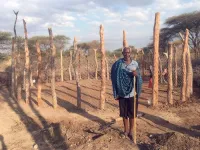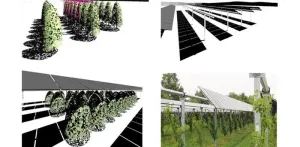(Press-News.org) A global survey of more than 30,000 people in 30 countries has revealed how people around the world feel about climate change, and how those emotions relate to perceptions of and support for climate interventions that could address the crisis. The new study is published in the journal Risk Analysis.
To investigate the intensity of “climate emotions” on a global scale and their intersection with perceptions of climate interventions, a team of researchers at Aarhus University in Denmark and the International Institute for Applied Systems Analysis (IIASA) in Austria conducted an online survey in 19 different languages for adults in 30 countries. Responses were collected from August to December 2022.
In their data analysis, the team mapped the intensity of five “climate emotions” -- fear, hope, anger, sadness and worry -- across the 30 countries. Clear differences in climate emotions emerged across the world. Here are some of the findings:
• Among the 12 most hopeful countries about climate change, there were 11 developing and emerging economies of the Global South (including Nigeria, Kenya, India and Indonesia). The only country representing the Global North in this group was the United States.
• European countries ranked among the least hopeful -- including Germany, Austria, and Sweden. This is despite participants from these countries (and the Global North) reporting less direct experience with natural disasters and lower expected harm from climate change.
• Anger and sadness were expressed most strongly by participants in three southern European countries: Spain, Italy, and Greece.
• Participants in Brazil expressed the greatest degrees of both fear and worry with respect to climate change.
An important goal of the study was to explore the intersection between climate emotions and how people around the world feel about climate intervention technologies involving solar radiation modification (SRM) and carbon dioxide removal (CDR). “In addition to types of climate action like mitigation and adaptation, climate intervention is receiving greater attention due to the greater evidence of climate disasters and insufficient pace of emissions reductions,” says Chad M. Baum, lead author of the study and Assistant Professor at the Development of Business Development and Technology at Aarhus University in Herning, Denmark.
He and his colleagues examined the statistical relationship between the five climate emotions and support for 10 different climate intervention technologies, including afforestation, direct air capture, and stratospheric aerosol injection.
Hope (expressed most strongly by respondents from the Global South) emerged as a key predictor of support for climate intervention, particularly for SRM approaches and novel forms of CDR, such as direct air capture. Being afraid was also positively related to support for climate-intervention technologies -- though with a smaller effect than being hopeful or worried. “Together with hope and worry, this suggests that fear, and its desire for protective action, is positively linked to support for more controversial forms of climate intervention,” says Baum.
“Our results,” he adds, “illustrate both the divergence of climate emotions at a global level and, crucially, the potential consequences of not engaging with diverse perspectives on climate change -- and some proposed solutions -- in the Global South.”
About SRA
The Society for Risk Analysis is a multidisciplinary, interdisciplinary, scholarly, international society that provides an open forum for all those interested in risk analysis. SRA was established in 1980. Since 1982, it has continuously published Risk Analysis: An International Journal, the leading scholarly journal in the field. For more information, visit www.sra.org.
###
END
International survey finds that support for climate interventions is tied to being hopeful and worried about climate change
New research reveals differences in how people feel about climate change in different parts of the world
2025-03-15
ELSE PRESS RELEASES FROM THIS DATE:
Cambridge scientist launches free VR platform that eliminates the fear of public speaking
2025-03-15
Today is World Speech Day, a day where we are called upon to embrace public speaking opportunities. Unfortunately, this call to action is unlikely to be widely embraced given that the majority of people are affected by speech anxiety and the fear of public speaking. Fortunately, however, there is now a free and highly effective solution.
At Lucy Cavendish College, University of Cambridge, researchers are using emerging digital technology to enrich and accelerate learning. Their Immersive Technology Lab received a national innovation award for a project that uses VR to better translate ...
Open-Source AI matches top proprietary model in solving tough medical cases
2025-03-15
Artificial intelligence can transform medicine in a myriad of ways, including its promise to act as a trusted diagnostic aide to busy clinicians.
Over the past two years, proprietary AI models, also known as closed-source models, have excelled at solving hard-to-crack medical cases that require complex clinical reasoning. Notably, these closed-source AI models have outperformed open-source ones, so-called because their source code is publicly available and can be tweaked and modified by anyone.
Has open-source AI caught up?
The answer appears to be yes, at least when it comes to one such open-source AI model, according to the findings ...
Good fences make good neighbors (with carnivores)
2025-03-15
A predator’s gotta eat, but sometimes what they eat harms people sharing the landscape, and that often leads to the carnivore’s death.
Fortified corrals are one strategy used in Tanzania to protect both livestock and vulnerable carnivore species. But then where do lions, leopards and hyenas go for dinner? Do they feed on the next herd over?
A new study led by Colorado State University has found that good fences truly do make good neighbors because fortified enclosures also benefit livestock keepers who live nearby. Instead of dining on easier meals next-door and negatively impacting neighbors who don’t ...
NRG Oncology trial supports radiotherapy alone following radical hysterectomy should remain the standard of care for early-stage, intermediate-risk cervical cancer
2025-03-15
Results from the NRG Oncology GOG-0263 phase III clinical trial testing the addition of cisplatin-based chemotherapy to adjuvant radiotherapy following radical hysterectomy and lymphadenectomy for patients with early-stage, intermediate-risk cervical carcinoma indicated that the addition of chemotherapy did not improve outcomes for patients and led to increased toxicity for patients. The outcomes of this trial support the use of the current standard of care using adjuvant radiotherapy alone following surgery. These results were ...
Introducing our new cohort of AGA Future Leaders
2025-03-14
We’re thrilled to announce the 16 distinguished early-career gastroenterologists and hepatologists selected for our 2025-2026 class of AGA Future Leaders. This AGA program cultivates effective leadership skills for professional advancement in AGA and within the field of digestive diseases.
Meet the AGA Future Leaders Class of 2025-2026
Lubin Arevalo, MD
Veroushka Ballester, MD, MS
Victor Chedid, MD, MS
Ryan Fawley, MD
Melissa Hershman, MD
Pichamol Jirapinyo, MD, MPH
Babu Pappu Mohan, MD
Carolyn Newberry, MD
Long ...
Sharks are dying at alarming rates, mostly due to fishing. Retention bans may help
2025-03-14
Despite the fear they may inspire in humans, sharks have far more reason to fear us. Nearly one-third of sharks are threatened with extinction globally, mostly as a result of fishing.
A team led by researchers at UC Santa Barbara discovered that mandates to release captured sharks won’t be enough to prevent the continued decline of these important ocean predators. These findings, published in Fish & Fisheries, highlight the importance of monitoring shark populations and combining different strategies for managing their numbers.
Some ...
Engineering excellence: Engineers with ONR ties elected to renowned scientific academy
2025-03-14
Three esteemed engineers with ties to the Office of Naval Research (ONR) have been elected to the prestigious National Academy of Engineering (NAE) Class of 2025. NAE members are among the world’s most accomplished engineers from business, academia and government.
“On behalf of the Office of Naval Research, I’m proud to extend my sincerest congratulations to these new members of the National Academy of Engineering,” said Chief of Naval Research Rear Adm. Kurt Rothenhaus. “Not only have these accomplished engineering professionals supported and conducted valuable naval-relevant research, they’re also enhancing the strength and prosperity of our nation by serving ...
New CRISPR-based diagnostic test detects pathogens in blood without amplification
2025-03-14
Bioengineering professor and The Grainger College of Engineering’s Dean, Rashid Bashir, led a team of researchers in a project that’s resulted in new technology that offers rapid, highly sensitive detection of multi-drug-resistant bacteria and other pathogens at low concentrations.
This research was featured in an article in the Proceedings of the National Academy of Sciences of the United States of America (PNAS).
Researchers designed a CRISPR-based test that rapidly detects low levels of pathogen genetic material in blood. This is done without the need for nucleic acid amplification.
In ...
Immunotherapy may boost KRAS-targeted therapy in pancreatic cancer
2025-03-14
PHILADELPHIA – Adding immunotherapy to a new type of inhibitor that targets multiple forms of the cancer-causing gene mutation KRAS kept pancreatic cancer at bay in preclinical models for significantly longer than the same targeted therapy by itself, according to researchers from the Perelman School of Medicine at the University of Pennsylvania and Penn Medicine’s Abramson Cancer Center. The results, published in Cancer Discovery, prime the combination strategy for future clinical trials.
Combatting the “undruggable” ...
Growing solar: Optimizing agrivoltaic systems for crops and clean energy
2025-03-14
Agrivoltaic systems, which combine solar power generation with agricultural practices, offer a promising solution to the growing demand for both renewable energy and food production. By integrating solar panels with crops, these systems not only address the land use conflict between agriculture and energy production, but they also provide important benefits such as reducing crop water stress and offering protection against extreme weather events. In addition, agrivoltaics can contribute to biodiversity by providing pollinator habitats and forage production. ...
LAST 30 PRESS RELEASES:
This ancient plant-eater had a twisted jaw and sideways-facing teeth
Jackdaw chicks listen to adults to learn about predators
Toxic algal bloom has taken a heavy toll on mental health
Beyond silicon: SKKU team presents Indium Selenide roadmap for ultra-low-power AI and quantum computing
Sugar comforts newborn babies during painful procedures
Pollen exposure linked to poorer exam results taken at the end of secondary school
7 hours 18 mins may be optimal sleep length for avoiding type 2 diabetes precursor
Around 6 deaths a year linked to clubbing in the UK
Children’s development set back years by Covid lockdowns, study reveals
Four decades of data give unique insight into the Sun’s inner life
Urban trees can absorb more CO₂ than cars emit during summer
Fund for Science and Technology awards $15 million to Scripps Oceanography
New NIH grant advances Lupus protein research
New farm-scale biochar system could cut agricultural emissions by 75 percent while removing carbon from the atmosphere
From herbal waste to high performance clean water material: Turning traditional medicine residues into powerful biochar
New sulfur-iron biochar shows powerful ability to lock up arsenic and cadmium in contaminated soils
AI-driven chart review accurately identifies potential rare disease trial participants in new study
Paleontologist Stephen Chester and colleagues reveal new clues about early primate evolution
UF research finds a gentler way to treat aggressive gum disease
Strong alcohol policy could reduce cancer in Canada
Air pollution from wildfires linked to higher rate of stroke
Tiny flows, big insights: microfluidics system boosts super-resolution microscopy
Pennington Biomedical researcher publishes editorial in leading American Heart Association journal
New tool reveals the secrets of HIV-infected cells
HMH scientists calculate breathing-brain wave rhythms in deepest sleep
Electron microscopy shows ‘mouse bite’ defects in semiconductors
Ochsner Children's CEO joins Make-A-Wish Board
Research spotlight: Exploring the neural basis of visual imagination
Wildlife imaging shows that AI models aren’t as smart as we think
Prolonged drought linked to instability in key nitrogen-cycling microbes in Connecticut salt marsh
[Press-News.org] International survey finds that support for climate interventions is tied to being hopeful and worried about climate changeNew research reveals differences in how people feel about climate change in different parts of the world





